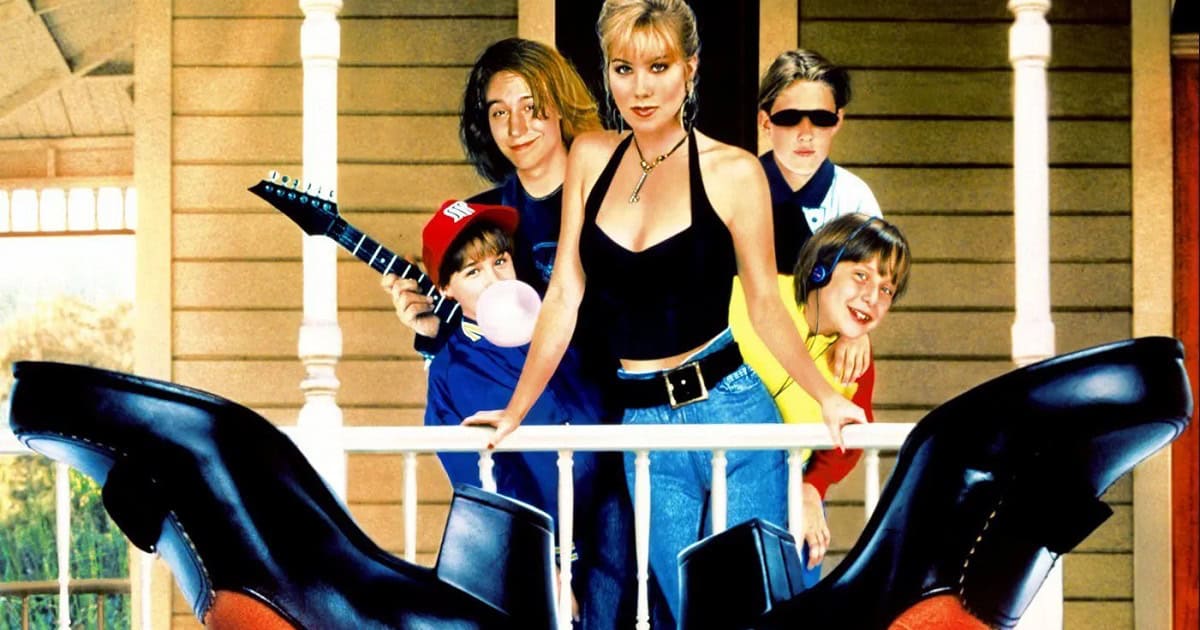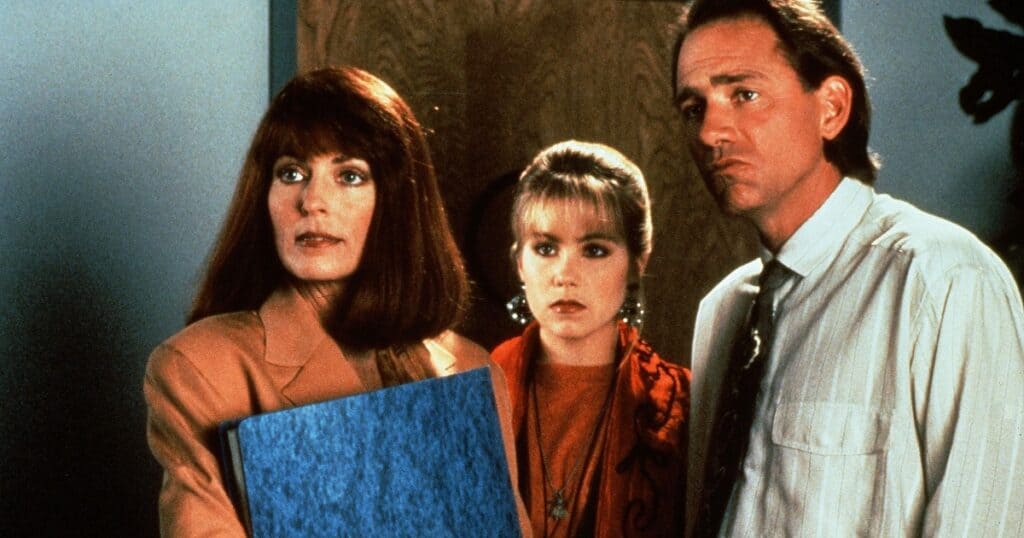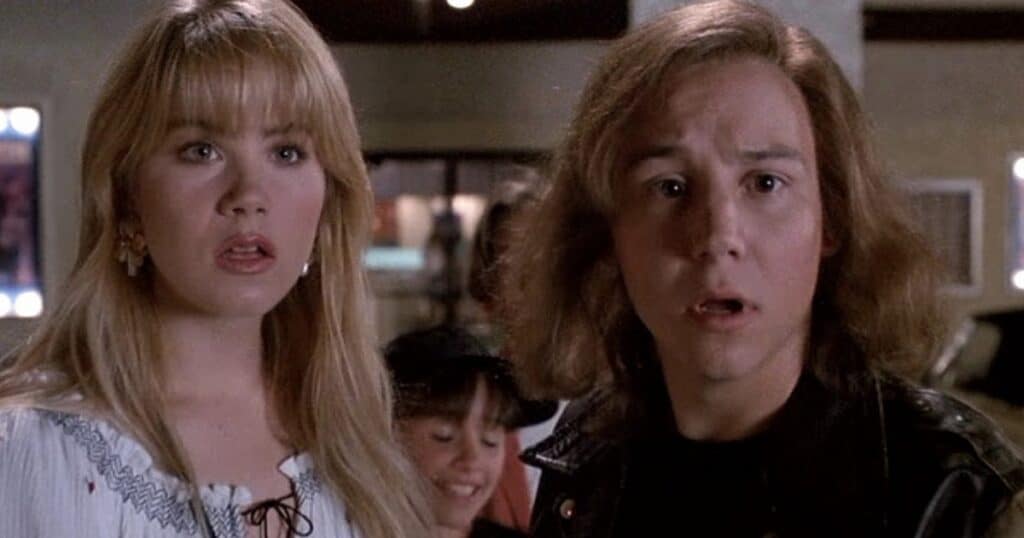
[ad_1]
It was a movie with a questionable title. A lot of critics were rough on it. Gene Siskel even called it one of the worst movies of the year. It came and went in theatres with few movie-goers paying any attention. But in the years since its release, it has become a beloved cult classic, with a legion of fans that love quoting its memorable lines. Some of its youngest viewers were drawn in by what they saw as a wish fulfillment concept: What would you do if the babysitter croaked on the first day of your mom’s vacation… so you had the house to yourself for two months straight? We get to see what the Crandall kids would do in the 1991 comedy Don’t Tell Mom the Babysitter’s Dead – and it’s time for this one to be Revisited.
Don’t Tell Mom the Babysitter’s Dead wouldn’t exist if it weren’t for Paul Brickman’s 1983 coming-of-age film Risky Business, which starred Tom Cruise as a young Bob Seger fan. When his parents go out of town, he takes the opportunity to dance around the house in his underwear, wreck his dad’s Porsche, get on the bad side of a pimp, and turn his parents’ home into a brothel. Aspiring screenwriter Neil Landau was a fan of Risky Business and was inspired to take the set-up and flip it on its head. As he told Buzzfeed, the idea he wanted to explore was, “What if the parents went out of town and instead of the kids destroying everything, they got their shit together? If anybody underestimated them, what if they actually were able to function in the adult world because they were forced to?” In 1987, he teamed up with novelist Tara Ison to write the script. The title on the front page was The Real World – and it looked like their reality was going to become a reflection of their script, because just like the young lead character quickly finds success in the corporate world, they found success in Hollywood. The two twenty-somethings were able to sell their script to a major studio, 20th Century Fox.
For the lead role, Landau and Ison envisioned someone like Winona Ryder, who was on the rise at the time, with roles in Lucas, Beetlejuice, and Heathers. Ryder was never attached to the project, but Fox was able to get Justine Bateman of the popular sitcom Family Ties to sign on. And they also had Landau and Ison do some major script rewrites.
The story centers on the Crandall family. After dedicating seventeen years of her life to her children, Mrs. Crandall is ready for a two-month vacation in Australia. She’s so focused on relaxing, she’s not even going to take the time to make daily calls to her kids. Seventeen-year-old Sue Ellen – who everyone calls Swell – is expecting two months of freedom. But then Mom reveals that she has hired a babysitter to watch the kids for her entire vacation. Landau and Ison originally wrote the babysitter as a nice old lady who gets along with the Crandalls before dropping dead of natural causes. Fox thought that would be too sad, so they had her rewritten to be a whistle-blowing taskmaster who manages to piss everyone off very quickly. She assigns daily chores, has the kids wear name tags and write reports, turns off the TV, interrupts a date. She even makes Swell’s tomboy sister wear a dress. Fox also wanted to have more characters in the mix, so they had the number of Crandall children increased from three to five. Swell has a stoner brother named Kenny, the tomboy sister is Melissa, their brother Zach’s world revolves around the girl he’s dating, and little Walter doesn’t want to do anything but watch TV.
The babysitter dies at the end of her first day on the job, so it looks like the kids are going to get their months of freedom after all. The problem is, when they drop her body off at the mortuary… along with a sign informing, “Nice Old Lady Inside Died of Natural Causes”… they forget to check her pockets. She had the money Mom left to keep the kids alive and fed for two months. So Swell has to get a job to support the family. A gig at a disgusting fast food place called Clown Dog only lasts long enough for her to make a romantic connection with co-worker Bryan. Then she forges a résumé, lies about her age, and lands a job as administrative assistant to executive Rose Lindsey at General Apparel West. A hiring that doesn’t sit well with receptionist Carolyn and her oily buddy Bruce.

Fox also wanted more information on the company Swell works for. That part of the story was irrelevant to Landau and Ison, but they dug into it for the studio. They made it a vitamin company and a book company before landing on the idea of it being a clothing company, allowing for a climactic sequence that involves a homespun fashion show. A good move, considering how popular that fashion show ended up being with viewers. Another good move was Fox’s decision to have the writers remove a scene where Swell would have accidentally killed Rose Lindsey’s cat. While doing these rewrites, Landau and Ison drew inspiration from Mike Nichols’ film Working Girl, which was about a secretary who gets the chance to quickly ascend the corporate ladder.
Unfortunately, Justine Bateman dropped out of the project before it could go into production, and Fox lost interest at that point. In 1989, they sold it off to Outlaw Productions, which was about to send Steven Soderbergh’s Sex, Lies, and Videotape into the world. Outlaw asked for one more rewrite, which was to make Swell’s love interest Bryan the brother of her receptionist nemesis Carolyn. Then they were ready to roll. They secured financing from HBO, hired Stephen Herek, director of the hit Bill & Ted’s Excellent Adventure, to take the helm, and got Ed O’Neil to pass the script to Christina Applegate, his co-star on the sitcom Married… with Children.
Applegate liked the script and signed on to star as Swell. Cast to play her siblings were Keith Coogan as Kenny, Christopher Pettiet as Zach, Robert Hy Gorman as Walter, and Jennifer Love Hewitt as Melissa… But Hewitt was on a TV show called Kids Incorporated at the time, and they wouldn’t give her the time off to do the movie. So she was replaced by Danielle Harris. At Landau’s suggestion, Joanna Cassidy was cast as Rose Lindsey, with John Getz as her boyfriend Gus, who tries to seduce Swell. Jayne Brook and David Duchovny were cast as Swell’s enemies Carolyn and Bruce, with Kimmy Robertson as the helpful Cathy and Josh Charles as Swell’s love interest Bryan. Concetta Tomei and Eda Reiss Merin make brief appearances as Mrs. Crandall and the ill-fated, short-lived babysitter Mrs. Sturak.
The babysitter is only in the movie for seven minutes. Kenny never even meets her. The title Don’t Tell Mom the Babysitter’s Dead – which Landau and many others involved with the project hated – may catch your eye, but the babysitter and her moment of death have little to do with the overall movie. This isn’t the dark comedy you may envision when you first hear the title. Things wouldn’t have been much different if it were Don’t Tell Mom the Babysitter Never Showed Up. Or Don’t Tell Mom the Babysitter Left Early. All the story needed was an excuse for the kids to have no adult supervision and no money to survive on. If you’re wondering why the Crandall kids don’t turn to their dad to help, that suggestion is shrugged off with one simple line: “Dad doesn’t care.” Given how flippant Mrs. Crandall is about leaving the kids and not calling them very often, you might wonder how much Mom cares as well.
When we meet the Crandalls, their house is a mess and the family unit is just as much of a disaster. So while a lot of critics wrote off the movie as something stupid and inept, there actually is a good story in here. You expect the Crandalls to go completely wild with their two months of freedom. And for a while, most of the kids do go wild, using the petty cash Swell has access to at her job, wasting it on extravagant purchases like an entertainment system and a diamond ring. But eventually, things start to turn around. Right around the time Walter gets hurt by falling off the roof while trying to adjust the TV antenna, the Crandalls start to straighten up their act and clean up the house. Kenny in particular has a great character arc, going from someone who only cares about drugs and rock ‘n roll to someone who takes care of his family and has career goals. Keith Coogan is really the entertainment MVP of the film. His stoner character starts out hilarious, and he has great deliveries of lines like, “Dishes are done, man,” or even a simple F-bomb when his marijuana plant falls off his windowsill. And he really sells Kenny’s evolution as the story plays out.
Applegate has the more serious role compared to a lot of her co-stars. Many of them have the chance to go over-the-top, while she has to play things more grounded. And she did a great job, proving she was a capable lead. At this time, she was best known for being the sexy airhead on Married… with Children. Swell has a shallow start, but quickly takes on the stress of having to work and support her siblings. It’s a nice story of a young girl being dropped into the adult world, finding herself in over her head, and yet somehow finding a way to succeed, against the odds. The original title Landau and Ison had on their script, The Real World, was very fitting for the story and would have saved some viewers from the disappointment of finding out Don’t Tell Mom the Babysitter’s Dead is actually about a teenager having success in the fashion industry. Online trivia will tell you that the title The Real World was dropped because MTV had just started airing their long-running reality series with the same name, but this movie was filmed in 1990 and released in June of 1991. The Real World didn’t premiere on MTV until eleven months later. So the reality show didn’t exist yet when some executive came up with Don’t Tell Mom the Babysitter’s Dead, figuring the movie would be better off with a goofy, attention-grabbing title. And they were probably right. The title may have been off-putting to some, but in the long run it probably drew in a wider audience. And then that audience got to experience the story Landau and Ison always wanted to tell. It underwent a lot of rewrites, but at its core it remained the same: it’s still about kids realizing they can function in the adult world and improve themselves in the process. Who would expect a movie with this title to have such a wholesome message?

Don’t Tell Mom the Babysitter’s Dead was made on a budget of ten million dollars and secured distribution through Warner Bros. As post-production wrapped up and the film headed toward its theatrical release, the filmmakers were feeling very positive about it. There was hope that this would kick off a franchise. Sequels were being imagined with set-ups like Don’t Tell Mom We Lost Walter. But it only ended up earning twenty-five million at the box office… Not enough for the producers to greenlight a sequel.
The film really reached its audience once it hit VHS and then cable, where it was in heavy rotation on HBO, since they had provided the funding. That’s when young viewers started watching the movie repeatedly, witnessing the evolution of the Crandall family over and over. The film quickly attained cult classic status, and fans can be heard quoting its lines to this day. “Dishes are done, man.” “I’m right on top of that, Rose.” “TV rots your brains.”
Don’t Tell Mom the Babysitter’s Dead is one of the most popular projects Christina Applegate has ever worked on. She told Buzzfeed that she felt it gained that popularity because viewers could relate to the characters and found hope in the story. She said, “Sue Ellen was kind of pissed off, she was not doing great in school, not participating in her family so much. She was relatable to a lot of teenagers who feel like the burden of the world is on them. They’re so dramatic about everything and I think in her success, there’s hope. When I’ve seen it now as an adult, that’s what I see: It’s a feel-good movie. Everyone gets a second chance. Everyone gets the chance to turn themselves around, and all kids want to feel that way. They don’t want to feel stuck in what they are. These characters give kids hope, and I think that’s thematically what you walk away from it believing and sensing and seeing.”
So what if Don’t Tell Mom the Babysitter’s Dead wasn’t successful enough to get a sequel? It did become popular enough to get a remake thirty-three years later. And regardless of how viewers react to that remake, its existence does show that the filmmakers did something right with the original. They made something that entertained people, that made them feel better about their lives, and it has been doing that for decades now. So if you need some fun and hope injected into your day, go back to Don’t Tell Mom the Babysitter’s Dead. It’s definitely worth revisiting.
[ad_2]